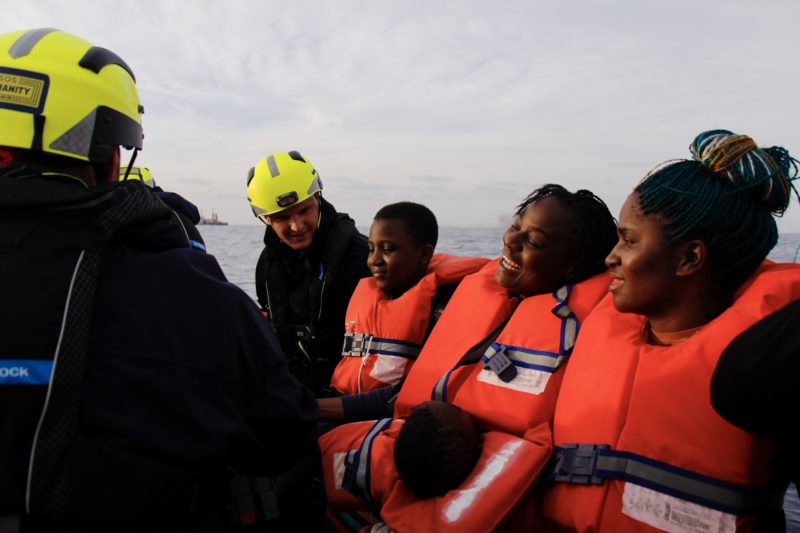Antoine, lawyer from France, Cultural Mediator on Board Humanity 1

“It was impressive to see the motivation and determination of the rescued people”
At home, Antoine works as a lawyer, but during the winter operation of the rescue ship Humanity 1, the Frenchman volunteered as a cultural mediator. During this time, the crew rescued 261 people from distress off the Libyan coast. Here, Antoine reports on his work on board.
As a lawyer, I had been in contact with search and rescue NGOs for several years. In November, SOS Humanity responded favorably to my application, and this was the beginning of an exciting human adventure.
I work in criminal and migration law. I also studied Arabic for several years in Jordan and Egypt. And, for six summers, I worked as a lifeguard on the beaches of the French coast. I was therefore perfectly eligible for the position of the ‘cultural mediator’ on board. My role was to translate, but I also participated in rescue operations, addressing people in French or Arabic.
“We have to perform miracles”
I can remember the scene of our second rescue well, when a wooden boat was close to capsizing in the swell. According to the RHIB leader, we had to “try to do miracles”. The tension was at its peak. The 49 people on board the boat were shouting, crying, begging us to rescue them quickly. In the middle of the night, in the swell and with this apocalyptic scene before our eyes, I had to keep telling them to remain calm and seated. Any movement could dangerously unbalance the boat.

The manoeuvre, in both operational and linguistic terms, was perilous. At the moment of first contact, we have to make the rescued people understand that we are not Libyans and that we are not bringing them back to the place from which they had fled. However, because of panic, some people may only hear “Libyans” in the sentence “We are not Libyans”. Therefore, a simple sentence in English needs to be said first before starting the dialogue in Arabic.
Arabic can also be used to manage relations with the so-called Libyan Coast Guard when they are present on scene. For example, I had to translate a message from the captain on the radio to a Libyan boat: the latter had forcibly taken some people on board while the Humanity 1 was busy with another rescue: a “pull-back” in technical terms. Our captain wanted to ask them to transfer these people to our ship, in accordance with international law, since Libya is a land of war and torture and not a “safe place”, as legally required. It was in vain: the Libyans did not respond.
Asylum procedures and conflict resolution
Once the rescued people were on board the Humanity 1, we informed them about the right to asylum and its procedure in Europe. It was impressive to see the motivation and determination of the rescued people. After the Libyan “hell”, and soon after their near-death experience in a rickety boat on the high seas, they were perfectly capable of understanding that they would now have to get through the arcane European administrative and judicial procedures.
It was also my job to prevent or resolve intercultural conflicts. To avoid conflicts on board, I had to know who the leader of a particular ethnic or national group was. This person could calm the others down or act as a spokesperson in case of problems. It helped to laugh with everyone, talk about their pain and anxieties. Their trust grew when I listened to them talk about the horrors in Libya. In return, I was listened to and respected.
As much as the rescue operations were full of adrenaline, the phase of taking care of the rescued people on board and organising daily life was full of intense human moments.
One survivor escaped the Libyans’ bullets – others were less fortunate
I remember a proud Egyptian who broke down in tears as he recounted the abuse, the cigarette burns, and his incredible escape from jail. He managed to destroy a clay wall and dozens of people escaped with him to the coast. Many died from the guards’ bullets. He managed to get to the sea. I hope he will have the opportunity to be happy.
Every day I saw tears on the faces of the Humanity 1 team. I was not immune to it either. The stories told are so horrific or touching. The tasks to be performed during the rescues were so physically and psychologically exhausting that some people reached their limits. But every day, I saw these same people giving their best to help, again and again.
The 261 people rescued were able to disembark in the middle of December in Europe – but only after a two-day journey to the assigned Italian port of Bari. Since the right-wing government of Giorgia Meloni has been in office in Italy, the macabre haggling over rescues and disembarkation of those rescued has become even more difficult for search and rescue NGOs. When will it end?